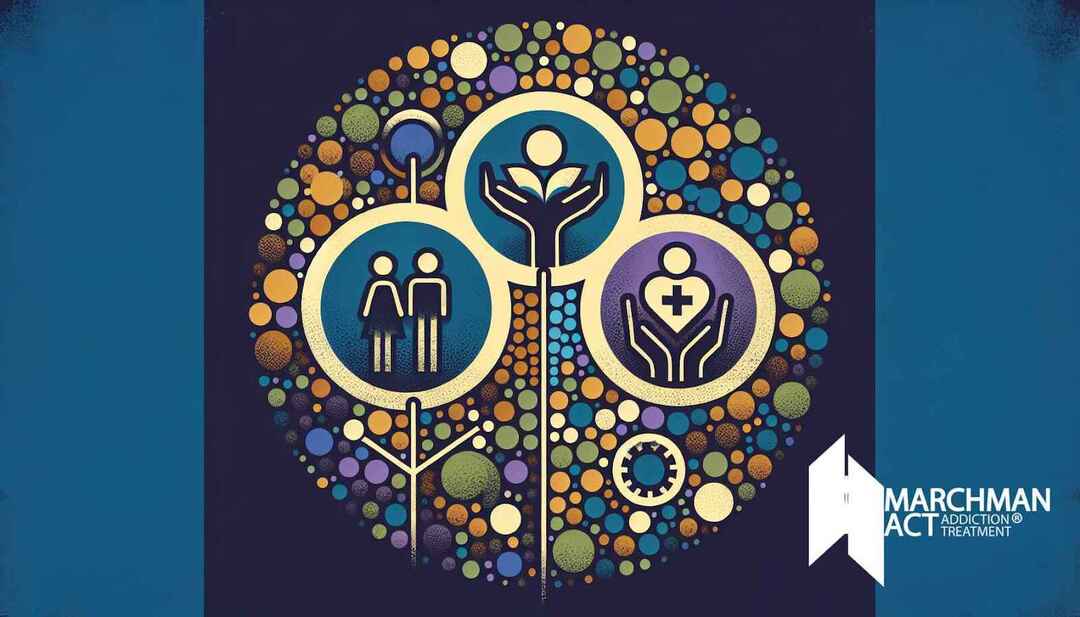Embracing Recovery in Orange County
The Landscape of Addiction Recovery in 2024
As we approach 2024, the landscape of addiction recovery in Orange County is poised to significantly evolve, reflecting broader advancements in mental health treatment and the integration of more holistic approaches. Intensive Outpatient Programs (IOPs) are at the forefront of this change, offering a flexible yet comprehensive treatment option that accommodates the complexities of modern life. The emphasis on customized care, integration of technology, and the growing acceptance of outpatient models showcase how recovery paradigms are adapting to meet diverse needs. This transformative period in addiction care signals a more accessible and personalized approach to achieving long-term recovery.
Why Orange County is a Hub for Recovery
Orange County has always stood out as a beacon of innovation and support within the recovery community. Its unique position, with access to cutting-edge medical and therapeutic resources, creates an ideal environment for individuals seeking recovery from substance abuse. The region benefits from a collaborative network of healthcare providers, treatment facilities, and recovery groups, making it a hub for those looking to start their journey toward healing. In addition, the community’s openness to embracing new treatment modalities-paired with the scenic beauty and tranquility of the area-further solidifies its reputation as a sanctuary for recovery.
Marchman Act Addiction Treatment’s Role
In the fabric of Orange County’s recovery ecosystem, Marchman Act Addiction Treatment’s role is both unique and crucial. Leveraging the provisions of the Marchman Act Florida, our institution provides a pathway to recovery for individuals who may not voluntarily seek treatment due to the severity of their addiction. By intervening in such critical situations, Marchman Act Addiction Treatment not only saves lives but also contributes to the larger community’s health and well-being. With a commitment to offering tailored and compassionate care, our approach aligns with Orange County’s broader mission to address substance abuse with dignity, hope, and effectiveness, ensuring that recovery is accessible to all who need it.
Understanding Intensive Outpatient Programs (IOPs)
Defining IOPs in the Addiction Recovery Process
Intensive Outpatient Programs (IOPs) mark a critical juncture in the continuum of addiction recovery services. Distinguished by their structured therapeutic environments, IOPs provide a level of care particularly suited to individuals who do not require round-the-clock supervision but still necessitate comprehensive support. At the heart of IOPs, participants engage in a regimen of counseling sessions, group therapy, and educational workshops designed to facilitate recovery while allowing them to maintain their daily responsibilities at work, home, or school. This balance ensures that the process of recovery is integrated into the fabric of everyday life, making the transition smoother and more sustainable.
How IOPs Differ from Residential Treatment
The pivotal difference between Intensive Outpatient Programs and residential treatment lies in the living situation of the participant. While residential or inpatient treatment requires individuals to stay on-site 24/7, IOPs allow participants to live at home or in a sober living environment. This distinction is crucial as it affords a level of autonomy and flexibility not present in residential settings. Furthermore, IOPs often serve as a transitional phase for individuals stepping down from residential care, offering a structured support system while reintegrating into the community. The focus on real-world application of coping strategies and relapse prevention skills in a person’s natural environment sets IOPs apart, making them a vital component in the comprehensive care in rehab.
The Unique Advantages of IOPs for Recovery
IOPs offer several distinct advantages that make them a valuable option for many seeking recovery from substance abuse. Firstly, the flexibility of IOP schedules allows individuals to continue with their employment or education, maintaining a semblance of their routine, which can be therapeutic in itself. Secondly, IOPs provide a high level of care and support through regular therapy sessions and peer support groups, facilitating an environment of growth and accountability. This blend of professional guidance and community support aids in addressing not just substance abuse but also co-occurring mental health disorders, enhancing overall wellness. Moreover, participating in IOPs enables individuals to immediately apply the coping strategies learned in therapy to real-life challenges, reinforcing these skills through practice. This immediate applicability of therapeutic techniques to daily life challenges underscores the unique advantage of IOPs in fostering long-term recovery and resilience.
The Marchman Act and Its Importance in Florida
An Overview of the Marchman Act Florida
The Marchman Act, a pivotal piece of legislation in Florida, represents a crucial intervention method for individuals struggling with severe substance abuse issues. Designed to assist families and concerned parties in securing involuntary assessment and treatment for loved ones, this act is foundational to Florida’s approach to addiction recovery. With its roots deeply embedded in the state’s legal and healthcare systems, the Marchman Act offers a structured path for initiating treatment for those who are unable or unwilling to recognize their need for help. This legal framework is distinctive in its ability to protect both the rights of the individual and the public interest, foregrounding the importance of timely and appropriate care in the face of addiction crises.
How the Marchman Act Facilitates Involuntary Treatment
Understanding how the Marchman Act facilitates involuntary treatment is key to recognizing its value in the landscape of addiction recovery in Florida. At its core, this act allows for individuals suffering from substance abuse to be assessed and potentially treated without their initial consent, provided certain legal criteria are met. This is particularly critical in situations where the person’s decision-making capacity is severely compromised by their addiction. The process typically involves a court hearing and the testimony of medical professionals to ensure the decision is made with the individual’s best interests in mind. Such measures are not taken lightly, reflecting a balance between personal liberties and the urgent need for intervention. For families feeling powerless in their attempts to help their loved ones, the Marchman Act can serve as a lifeline, offering a structured, legal avenue towards recovery.
Marchman Act: A Pathway to Recovery for Unwilling Individuals
The significance of the Marchman Act as a pathway to recovery for unwilling individuals cannot be overstated. It acknowledges the complex nature of addiction-a condition that often leaves those affected in a state of denial or resistance to treatment. By providing a legal mechanism to initiate care, the Marchman Act ensures that individuals who might never have sought help on their own can receive the treatment necessary for recovery. This pathway is not just about managing substance abuse, it encompasses a holistic approach to healing, integrating physical, mental, and emotional support through tailored treatment plans. Facilities like Marchman Act Addiction Treatment harness the statute’s provisions to extend a lifeline to those mired in the depths of addiction, bridging the gap between the need for help and accepting that help. For many, it represents the first, crucial step towards a life reclaimed from the grasp of substance abuse.
Components of Effective IOPs in Orange County
Customized Addiction Treatment Programs
In our quest to provide the most comprehensive care, Marchman Act Addiction Treatment understands the critical importance of personalized treatment plans. Effective Intensive Outpatient Programs (IOPs) in Orange County, particularly as we move into 2024, must go beyond one-size-fits-all solutions. Every individual comes with a unique set of challenges, backgrounds, and specific needs that require tailor-made approaches for effective treatment and sustainable recovery. Customizing IOPs involves a detailed assessment of each participant, incorporating their personal history, substance use patterns, and co-occurring mental health disorders. This person-centered approach not only enhances the treatment experience but also significantly improves outcomes, ensuring that each participant’s journey to recovery is as unique as they are. Resources like the Customizing IOP for Diverse Needs in Orange County emphasize our commitment to bespoke treatment paths that acknowledge and embrace individual differences.
Holistic Approaches to Substance Abuse Therapy
Holistic approaches to therapy have been gaining momentum in the field of addiction recovery, advocating for the treatment of the ‘whole person.’ In Orange County, effective IOPs are distinguished by their inclusion of holistic therapies alongside conventional methods. These may include mindfulness practices, yoga, art, and music therapies, as well as nutritional and physical wellness programs. The holistic model operates on the understanding that substance abuse and addiction are multifaceted issues, often stemming from or causing physical, emotional, mental, and spiritual imbalances. By addressing these areas concurrently, holistic therapies aim to heal the root causes of addiction, not just the symptoms, promoting overall well-being and lasting recovery. The inclusion of such approaches aligns with the vision of Marchman Act Addiction Treatment to offer a recovery pathway that respects and nurtures the holistic health of individuals.
The Integration of Mental Health Services
The integration of mental health services within IOPs is another hallmark of effective addiction treatment in Orange County. Recognizing the strong correlation between substance abuse and mental health disorders, leading IOPs now offer integrated treatment plans that address both issues simultaneously. This dual-diagnosis approach ensures that participants receive comprehensive care that deals with the complexities of co-occurring conditions. Therapies may encompass psychiatric evaluations, medication management (when necessary), individual counseling, and group therapy sessions that specifically focus on the interplay between addiction and mental health. The objective is to equip individuals with the tools and strategies they need to manage their mental health effectively, mitigating one of the key risk factors for relapse. Marchman Act Addiction Treatment, through its expansive network and Addiction Recovery Programs, emphasizes the integration of mental health services as a core component of its IOP offerings, reflecting a commitment to the comprehensive wellness of its participants.
Evaluating IOP Benefits for Addiction Recovery

Flexibility and Balance: Maintaining Daily Responsibilities
Intensive Outpatient Programs (IOPs) in Orange County offer a flexible approach to addiction recovery, allowing individuals to balance their treatment with daily responsibilities. This aspect is particularly beneficial for those who cannot afford to take extended time away from their jobs, education, or family duties. IOPs are structured to accommodate various schedules, ensuring participants receive the necessary support without disrupting their day-to-day lives. By integrating treatment sessions during the day, in the evening, or over weekends, IOPs make it possible for individuals to maintain their work or school commitments while actively working on their recovery. This balance of treatment and personal obligations fosters a sense of normalcy and allows for a gradual transition into sober living, making IOPs a valuable option for many seeking help for addiction in Orange County.
Building A Supportive Recovery Community
The journey to recovery from substance abuse is not one to be taken in isolation. IOPs in Orange County are designed to cultivate a supportive community among participants, facilitating connections with others who are navigating similar challenges. Group therapy sessions and peer-led workshops are integral components of IOPs, providing a platform for sharing experiences and strategies for overcoming addiction. This sense of community is invaluable, offering encouragement and understanding from those who truly comprehend the journey. Moreover, IOPs often connect participants with wider support networks, including NA Meetings for Support and AA meetings, which can extend the circle of support beyond the program itself. In essence, building this recovery community fosters a robust support system that participants can rely on during and after their treatment, enhancing the effectiveness of the recovery process.
Continuous Care and Post-Treatment Support
One of the critical benefits of IOPs is the provision of continuous care and support even after the completion of the program. The transition phase from intensive outpatient treatment back to everyday life is pivotal in one’s recovery journey. It is during this period that individuals are most vulnerable to relapse. Recognizing this, IOPs in Orange County ensure that participants are not left to navigate this challenging phase alone. They offer ongoing counseling sessions, follow-up care, and access to aftercare programs designed to reinforce the coping skills and strategies learned during treatment. Furthermore, the continuity of care fosters a lasting connection between participants and their therapists, allowing for adjustment in treatment plans as necessary to meet evolving needs and circumstances. This ongoing support is essential for sustaining the gains made during the program and for encouraging long-term recovery and wellness among individuals recovering from addiction.
Selecting the Right IOP in Orange County for 2024
As we move into 2024, selecting the right Intensive Outpatient Program (IOP) in Orange County is crucial for individuals seeking to overcome addiction and embark on the path to recovery. With various IOPs available, understanding key elements that signify quality and align with your recovery needs becomes paramount. This section delves into what to look for in high-quality IOPs, questions you should ask potential programs, and how Marchman Act Addiction Treatment’s network of IOPs stands out as a beacon of hope and excellence in addiction treatment.
What to Look for in High-Quality IOPs
High-quality Intensive Outpatient Programs in Orange County should embody a blend of comprehensive therapy options, personalized care, and professional excellence. First and foremost, a robust IOP will offer a variety of therapeutic modalities such as individual counseling, group therapy, and family sessions to address the multifaceted nature of addiction. Additionally, look for programs that integrate holistic approaches, including mindfulness, fitness, and nutritional counseling, acknowledging the interconnectedness of physical and mental health in recovery.
Another critical factor is customization, the program should be willing and able to tailor treatment to meet individual needs, acknowledging that recovery is not a one-size-fits-all process. The IOP’s staff credentials, including accreditation and experience in addiction medicine and mental health, also play a vital role in ensuring quality care. Furthermore, a high-quality IOP will foster a supportive community atmosphere, encouraging peer support and facilitating connections that bolster recovery outside of clinical sessions.
Questions to Ask Potential Programs
Before enrolling in an IOP in Orange County, it’s essential to gather as much information as possible to ensure the program aligns with your recovery goals. Consider asking the following questions:
- What types of therapy and treatment modalities do you offer? Understanding the range of therapies available can help you determine if the program’s approach matches your needs.
- How do you tailor the treatment plan to individual requirements? This question is crucial to assess the program’s flexibility and commitment to personalized care.
- What qualifications and experience do the staff hold? Knowledgeable and compassionate staff are the cornerstone of effective addiction treatment.
- Can you describe the typical day or week in the program? Getting a sense of the program’s structure can help you envision how it fits into your life.
- What support is available for transitioning out of the IOP? Post-treatment support is vital for sustaining recovery, making it important to understand how the program addresses this phase.
- How do you involve families in the treatment process? Family support can be pivotal in recovery, so it’s beneficial to know if and how your loved ones will be included.
Marchman Act Addiction Treatment’s Network of IOPs
Marchman Act Addiction Treatment represents the pinnacle of dedication and innovation in addiction recovery with its network of Intensive Outpatient Programs in Orange County. Our unique approach combines the strengths of the Marchman Act Blog on Addiction with a deep understanding of the community’s needs, ensuring that every individual has access to exceptional care tailored to their unique journey towards sobriety.
Our network of IOPs stands out due to our commitment to personalized, holistic treatment plans that consider all aspects of an individual’s well-being. From the onset, we assess each person’s specific situation to craft a recovery pathway that respects both their challenges and their strengths. Our use of evidence-based practices, combined with innovative therapies and the support of a compassionate recovery community, ensures that individuals not only achieve sobriety but also learn to thrive in their daily lives.
Choosing Marchman Act Addiction Treatment for your IOP needs in Orange County means selecting a partner committed to your long-term recovery. Our programs are designed to empower you with the tools, knowledge, and support necessary to overcome addiction, rebuild your life, and sustain lasting wellness.
Innovations in IOPs for Enhanced Recovery
Technology-Driven Recovery Solutions
The integration of technology into Intensive Outpatient Programs (IOPs) is revolutionizing addiction recovery in Orange County, setting the stage for an even more effective approach in 2024. Digital health interventions, including mobile apps for mental health and sobriety tracking, virtual reality (VR) for exposure therapy, and teletherapy sessions, are becoming commonplace. These technology-driven solutions offer unprecedented access to support and resources, enabling participants to remain engaged with their recovery process outside of traditional therapy sessions. The Delray Beach Intensive Outpatient Program, for example, leverages digital platforms to extend care, facilitating continuous engagement and support, which is crucial for sustaining long-term recovery. Through these innovations, IOPs can deliver personalized, accessible, and flexible treatment options that meet the needs of today’s diverse patient population.
The Evolving Role of Behavioral Health Services
As the landscape of addiction recovery evolves, so too does the role of behavioral health services within IOPs. These services are expanding beyond traditional counseling and psychotherapy to encompass a broader spectrum of care, including psychiatric evaluation, medication management for co-occurring disorders, and evidence-based therapies like Cognitive Behavioral Therapy (CBT) and Dialectical Behavior Therapy (DBT). The integration of these services reflects a more holistic understanding of substance abuse as a complex interplay of biological, psychological, and social factors. Behavioral health services are now more closely aligned with medical treatment, acknowledging the necessity of addressing mental health issues alongside addiction to ensure a comprehensive recovery process. This holistic approach is exemplified in facilities like the Reco Intensive Addiction Treatment Center, where a full range of behavioral health services supports the individual’s journey to recovery by treating the whole person rather than just the symptoms of addiction.
Customizing IOPs for Diverse Needs
The customization of IOPs to meet the diverse needs of individuals in recovery is a hallmark of innovative programs in Orange County. Recognizing that each person’s path to recovery is unique, leading IOPs are incorporating a wide array of therapeutic modalities, lifestyle interventions, and flexible scheduling options to accommodate different backgrounds, schedules, and stages of recovery. Personalized treatment plans take into account not only the specifics of an individual’s substance abuse but also their personal strengths, weaknesses, life circumstances, and co-occurring mental health conditions. By adapting care to fit the individual, IOPs can more effectively engage participants, foster meaningful progress, and reduce the risk of relapse. Programs like the Reco Institute for Addiction Recovery exemplify this approach, offering tailored recovery solutions that emphasize the personalization of care to ensure each participant receives the most appropriate and effective treatment. This shift towards customization reflects a broader trend in healthcare towards patient-centered care, acknowledging the complexity of addiction and the need for multifaceted, individualized treatment strategies.
Success Stories: Inspirations from IOP Alumni
Transformation Through Intensive Outpatient Programs
The power of transformation within Intensive Outpatient Programs (IOPs) is nowhere more visible than in the stories of those who have walked the path of recovery in Orange County. These individuals, having once struggled with the grip of addiction, have emerged as beacons of hope, illustrating the profound impact that tailored, compassionate care can have. One such story is of Alex, who entered an IOP with a sense of desperation but found a new beginning. Through a combination of individual therapy, group sessions, and the unwavering support of addiction treatment professionals in Orange County, Alex learned to navigate the challenges of sobriety in the real world. Reflecting on his journey, he credits the program for not just his recovery, but for the life skills and resilience he gained, which now empower him to face life’s ups and downs with confidence.
The Journey to Long-Term Recovery
For many entering IOPs, the journey to long-term recovery is a gradual one, marked by milestones, setbacks, and ultimately, triumph. Sarah’s story exemplifies this journey, showcasing the essential role of continuous care and support. After completing her intensive outpatient program, she engaged in substance abuse counseling in Orange County to maintain her progress. Sarah found that the journey beyond the program was as crucial as the treatment itself. The post-treatment support, including access to community resources like AA meetings for addiction support, provided her with a network of individuals who understood and supported her efforts to stay sober. Her story underscores the importance of a cohesive, long-term approach to recovery, one that encompasses care, support, and community to navigate the complexities of life after addiction.
Integrating IOPs with Residential Treatment Plans
Blending the Best of Both Worlds for Comprehensive Care
The integration of Intensive Outpatient Programs (IOPs) with residential treatment plans signifies a strategic fusion of care levels, ensuring a continuum that addresses the diverse needs of individuals at various stages of recovery. In Orange County, this blend offers a comprehensive approach, combining the immersive support of residential care with the flexibility and real-world application of IOPs. This hybrid model is particularly effective because it allows individuals to begin their recovery journey in a structured, supportive environment and then gradually transition to a less restrictive setting while still receiving intensive treatment. This combination supports sustained recovery by allowing individuals to apply the coping strategies and life skills they learn in real-time, significantly improving their adaptability and resilience in facing daily life challenges without relapse.
How to Transition from Residential to Outpatient Care
Transitioning from residential to outpatient care is a critical phase in the recovery journey, requiring careful planning and support to ensure success. To facilitate a smooth transition, Marchman Act Addiction Treatment employs a personalized approach, beginning with a thorough assessment of each individual’s progress and readiness. Factors such as stability, coping skills, support systems, and ongoing treatment needs are carefully considered to create a tailored transition plan. The plan includes gradual exposure to more independent living situations, continued therapy sessions, and support group meetings, often incorporating services like those found in the Ultimate Guide to Marchman Act in Orange County, to reinforce recovery principles and ensure individuals are well-equipped to manage their sobriety outside of a residential setting. Additionally, this phase often involves increased family involvement and education, ensuring that the individual’s support network is strong and informed.
Marchman Act Addiction Treatment’s Holistic Pathways
Marchman Act Addiction Treatment’s holistic pathways integrate IOPs with residential treatment plans, underscoring the importance of treating the whole person-mind, body, and spirit-for lasting recovery. This holistic approach acknowledges that recovery from addiction involves much more than abstaining from substance use, it requires a transformation in how individuals relate to themselves and the world around them. By incorporating practices such as meditation, nutritional counseling, and physical fitness, alongside conventional therapy and group support, Marchman Act Addiction Treatment offers a comprehensive recovery program that addresses the multifaceted nature of addiction. This integrated approach ensures that individuals are not only supported in overcoming substance abuse but are also guided in establishing healthy, fulfilling lives post-treatment. The commitment to providing a seamless continuum of care from residential through outpatient settings empowers individuals to navigate their recovery journey with confidence and support at every step.
Future of IOPs in Orange County Beyond 2024
Advancements in Addiction Therapy and Rehabilitation
The future of Intensive Outpatient Programs (IOPs) in Orange County looks promising, with cutting-edge advancements in addiction therapy and rehabilitation anticipated to further enhance the effectiveness of treatment. As we move beyond 2024, we can expect to see a greater integration of digital health tools, such as artificial intelligence (AI) and machine learning algorithms, to provide more customized and dynamic treatment plans. These technologies have the potential to analyze vast amounts of data from individual patients, enabling therapists to identify patterns and predict outcomes more accurately. Moreover, the expansion of virtual reality (VR) therapies will allow individuals in recovery to experience and navigate real-world scenarios in a controlled, therapeutic setting, reinforcing coping strategies and resilience against triggers. The commitment to adopting these technological innovations reflects a broader trend in the addiction treatment field towards more personalized, effective care, embodying the ethos of Marchman Act Addiction Treatment’s dedication to embracing advancements that support long-term recovery.
The Role of Community in Shaping Recovery Services
The role of the community in shaping recovery services in Orange County is poised to become more significant than ever as we advance beyond 2024. The insights and needs of the recovery community are increasingly recognized as invaluable resources for informing the development and refinement of Intensive Outpatient Programs. Peer-led initiatives and community feedback mechanisms are expected to play a crucial role in tailoring services to more effectively meet the needs of individuals seeking recovery. This shift towards community-centric models of care fosters a more inclusive and supportive recovery environment, where services not only address the clinical aspects of addiction but also nurture the sense of belonging and purpose that is essential for sustained sobriety. As part of this evolution, Marchman Act Addiction Treatment is committed to deepening its engagement with the Orange County recovery community, facilitating collaborations that enrich and diversify the range of recovery resources available.
Staying Ahead: Marchman Act Addiction Treatment’s Commitment
Looking towards the future, Marchman Act Addiction Treatment remains steadfast in its commitment to stay ahead of the curve in delivering state-of-the-art Intensive Outpatient Programs in Orange County. This commitment entails a proactive approach to adopting new therapies, enhancing program flexibility, and expanding access to care through innovative delivery models. As part of its dedication to excellence, Marchman Act Addiction Treatment invests in ongoing training and development for its staff, ensuring that they are equipped with the latest knowledge and tools to support individuals in their recovery journeys. Additionally, by fostering partnerships with research institutions and technology developers, Marchman Act Addiction Treatment aims to be at the forefront of implementing evidence-based advancements in addiction therapy and rehabilitation. This forward-looking perspective encapsulates Marchman Act Addiction Treatment’s pledge to provide comprehensive, cutting-edge treatment solutions that reflect the evolving landscape of addiction recovery, thus ensuring the best possible outcomes for the individuals and families it serves.
Navigating Your Recovery Journey with Marchman Act Addiction Treatment
Creating a Personalized Recovery Plan
At the core of effective addiction recovery is the development of a personalized recovery plan tailored to meet the unique needs, goals, and circumstances of each individual. Marchman Act Addiction Treatment recognizes the importance of personalization in fostering a successful journey toward sobriety. By combining evidence-based treatments with holistic approaches, our experts craft customized plans that address not only the substance use disorder but also the underlying factors contributing to it. Through detailed assessments, individuals are matched with therapies and activities that resonate most with their personal experiences and preferences, ensuring a more engaging and effective recovery process.
Customization extends to scheduling flexibility, types of therapy offered, and the inclusion of family support, all aimed at creating a comprehensive and adaptable framework for recovery. This individualized approach empowers those on the path to recovery, providing them with a sense of ownership and control over their treatment and outcomes. As individuals progress, their recovery plans are dynamically adjusted to reflect their evolving needs and achievements, reinforcing the foundation for long-term sobriety and well-being.
The Importance of Substance Use Recovery Plans
Substance use recovery plans are instrumental in establishing a clear, actionable path forward for those struggling with addiction. These plans serve as a roadmap, outlining the steps needed to achieve and maintain sobriety while also addressing the broader aspects of recovery, including mental health, physical wellness, and social reintegration. Marchman Act Addiction Treatment emphasizes the importance of these comprehensive plans, which are informed by clinical expertise, personal goals, and the latest research in addiction science.
By setting short-term and long-term goals, recovery plans provide milestones that encourage progress and offer a sense of accomplishment. They also identify potential triggers and challenges, equipping individuals with strategies to manage them effectively. This strategic approach to recovery underscores the value of proactive planning and continuous support in navigating the complexities of overcoming addiction. Adherence to a meticulously tailored recovery plan significantly enhances the likelihood of achieving lasting recovery, laying the foundation for a healthier, more fulfilling life free from the constraints of substance use disorders.
Finding Strength in the Orange County Recovery Community
The journey to recovery, while deeply personal, benefits immensely from the collective strength and support of the associated community. In Orange County, a vibrant recovery community provides a network of encouragement, understanding, and shared experience that can be invaluable for individuals in treatment. Encouraging engagement with this community is a fundamental aspect of the philosophy at Marchman Act Addiction Treatment. Participation in community activities, support groups, AA Meetings for Addiction Support, and other peer-led initiatives fosters a sense of belonging and provides practical insights and motivation from those who have faced similar challenges.
This community connection extends beyond structured meetings and events, offering informal support systems and social networks that reinforce recovery goals. Through these interactions, individuals gain diverse perspectives on overcoming the day-to-day challenges of recovery, along with the opportunity to contribute to the recovery of others. Forming these connections encourages accountability, enhances self-esteem, and promotes a positive outlook on one’s recovery journey. The Orange County recovery community stands as a testament to the power of collective action and mutual support in achieving lasting recovery, reminding individuals that they are not alone in their journey.
Conclusion: A Message of Hope and Healing

Empowerment Through Choice and Change
The journey of addiction recovery is fraught with challenges, yet it is also one of profound hope and potential transformation. Intensive Outpatient Programs (IOPs) in Orange County for 2024 embody this message of hope, offering flexible, individualized treatment options that empower individuals to embark on a path of healing while maintaining their daily responsibilities. The choice to seek help is a pivotal first step, and it is one that is supported and facilitated by the compassionate professionals in the field of addiction treatment. This proactive decision opens up a world of change, where old patterns are replaced with new, healthier coping mechanisms, and individuals are supported in rebuilding their lives. The ability to choose a treatment plan that fits one’s specific needs-while being rooted in evidence-based practices-ensures that every person has the best possible foundation for recovery.
Marchman Act Addiction Treatment’s Dedication to Recovery
Marchman Act Addiction Treatment stands as a beacon of dedication and support for those navigating the complexities of addiction in Florida. With a holistic approach that encompasses the Marchman Act’s framework for involuntary treatment, we offer a pathway to Addiction Recovery Pathways via Marchman Act that respects the dignity and autonomy of each individual. Our commitment to providing comprehensive care extends beyond the immediate needs of detoxification and treatment, we are deeply invested in the long-term well-being and recovery of our clients. Through our network of IOPs and residential treatment options, we tailor our services to meet the unique challenges and goals of each person we serve, ensuring a supportive, nurturing environment that fosters lasting recovery.
The Next Steps in Your Recovery Journey in Orange County
As you consider the next steps in your recovery journey in Orange County, remember that you are not alone. The path to recovery is one that is shared by many, supported by the expertise and compassion of addiction treatment professionals, and enriched by the strength of the recovery community. Marchman Act Addiction Treatment is here to guide you through each step of the process, from the initial decision to seek help, through the intricacies of treatment, and into the lifelong journey of recovery. Whether you are contemplating an IOP, require the structure of residential treatment, or are exploring the possibilities of the Marchman Act for a loved one, we invite you to reach out. Together, we can assess your needs, answer your questions, and embark on a personalized path toward healing and wholeness. Contact Marchman Act Addiction Recovery today to begin your journey of hope and healing in Orange County.
Frequently Asked Questions
Question: What makes IOPs in Orange County, especially those offered by Marchman Act Addiction Treatment, stand out as we approach 2024?
Answer: As we approach 2024, Marchman Act Addiction Treatment’s Intensive Outpatient Programs (IOPs) in Orange County are distinguished by their cutting-edge, holistic approach to addiction recovery. These programs are uniquely designed to cater to the multifaceted needs of our clients, integrating the latest advancements in addiction therapy with comprehensive mental health support. Significantly, our IOPs offer the flexibility required by modern lives, allowing participants to receive top-notch addiction rehabilitation while maintaining their daily responsibilities. With a focus on creating customized addiction treatment plans and fostering a supportive recovery community, Marchman Act Addiction Treatment is committed to empowering individuals on their journey to recovery, reflecting our dedication to excellence and innovation in addiction treatment services.
Question: How does Marchman Act Addiction Treatment incorporate the Marchman Act Florida into its IOP services, and what advantages does this provide for those seeking help in Orange County?
Answer: Marchman Act Addiction Treatment skillfully incorporates the provisions of the Marchman Act Florida into our Intensive Outpatient Programs to provide a unique advantage for individuals and families struggling with addiction. This legal framework allows us to offer avenues for involuntary treatment, creating lifesaving pathways for those who may be in denial or resistant to seeking help. By utilizing the Florida Marchman Act, we can intervene in severe cases, ensuring that even the most vulnerable individuals have access to our comprehensive addiction recovery programs. This capability ensures that all aspects of care-from initial assessment and involuntary treatment initiation to personalized recovery planning-are handled with the utmost care, respect, and professionalism, making Marchman Act Addiction Treatment a pioneer in offering effective, legally supported addiction recovery pathways in Orange County.
Question: In the blog ‘What to Know About IOPs in Orange County for 2024’, holistic approaches to addiction therapy were highlighted. Can you elaborate on how these are integrated into your IOPs?
Answer: At Marchman Act Addiction Treatment, we firmly believe in the holistic rehabilitation of our clients, recognizing that successful recovery from addiction encompasses not just the cessation of substance use but also the overall well-being of the individual. Our Intensive Outpatient Programs in Orange County brilliantly weave holistic approaches into the fabric of our addiction therapy offerings. This includes mindfulness practices, yoga, and art therapy, alongside nutritional and wellness programs, to support both mental and physical health. By addressing the physical, emotional, mental, and spiritual aspects of addiction, we promote comprehensive healing. This integration ensures that our participants receive a well-rounded recovery experience, preparing them for long-term success and wellness beyond our program, consistent with the innovative care perspectives laid out for 2024 and beyond.
Question: What support does Marchman Act Addiction Treatment offer to families of those in recovery, specifically in terms of engagement and education?
Answer: Marchman Act Addiction Treatment prioritizes family involvement as a cornerstone of effective recovery. Recognizing the vital role that families play in the rehabilitation process, our Intensive Outpatient Programs in Orange County offer a range of support services tailored to the needs of families. This includes dedicated family counseling sessions, educational workshops, and resources aimed at enhancing understanding of addiction, the recovery process, and ways to offer constructive support. Our approach fosters a supportive environment for both the individual in recovery and their loved ones, strengthening the foundation for long-term recovery by equipping families with the necessary tools for positive engagement and effective communication.
Question: Can you explain how Marchman Act Addiction Treatment’s IOPs prepare individuals for the transition back into everyday life in Orange County?
Answer: Preparing individuals for the successful transition back into everyday life is a critical component of our IOPs at Marchman Act Addiction Treatment. Our programs are designed to not only address addiction but also equip participants with real-life skills and strategies for sobriety maintenance. This preparation involves comprehensive coping strategies training, relapse prevention education, and the development of a solid aftercare plan. By focusing on real-world application, we ensure that participants can navigate the challenges and responsibilities of daily life with confidence. Our continuous care model also provides ongoing support post-program to reinforce the skills learned, facilitating a smoother reintegration into the community and sustaining long-term recovery in Orange County.




























